EDITED BOOKS
(most recent first, click links for further details)
(most recent first, click links for further details)

Infectious diseases, quarantined pests, invasive species, living modified organisms, and biological weapons. These are just some of the threats facing us in an increasingly interconnected and lawless world. How can we protect ourselves? Which international political regimes work best? Will the drive for profit always win out over safety and security? This book examines the different scientific and knowledge practices connected to biosecurity governance, including legal regimes, ecology, risk management and alternative knowledges. And things aren't getting any easier - the future of biosecurity is assessed in the context of uncertainties such as globalization and climate change. (London, Routledge, 2013)

After the Cold war, how do we define and regulate protection and insecurity? Contributors to this book discuss the role of private security companies, the political agency of refugees, the role of non-military security actors, the reconstruction of state capacity in post-conflict situations, the political role of the judiciary and the judicial regulation of armed conflict, and the changing relation between humanity and nature in environmental politics. Do we need a whole new paradigm of protection for the world of Trump and Brexit? (London, Routledge, 2006)
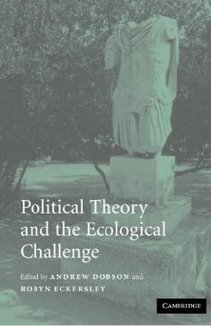
How has mainstream political theory reacted to the ecological challenge? In this book a team of renowned scholars think through the implications of this increasingly important encounter. Focusing on fourteen familiar political ideologies and concepts such as liberalism, conservatism, justice and democracy, the contributors question how they are reshaped, distorted or transformed from an environmental perspective. Lively, accessible and authoritative, this book should appeal to scholars and students alike. (Cambridge, Cambridge University Press, 2006)
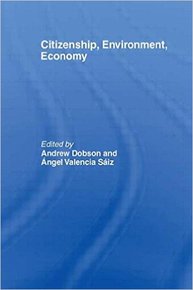
As governments around the world grapple with the challenge of delivering environmental sustainability, attention has recently focused on the role that citizens should play in meeting the challenge. In advanced industrial countries such as ours, which operate in the political framework of liberal capitalism, what relevance can we place on 'environmental citizenship'?
This book looks at the obstacles and opportunities which exist within this context and examines the possibility of ethical investment, the social economy and considers whether there is space in the capitalist economy for environmental citizens to 'do the right thing?' (London, Routledge, 2005)
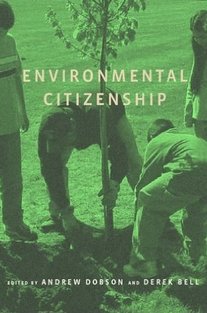
Promoting environmental citizenship as a path to achieving sustainability - encouraging people to act according to the public environmental good - offers an alternative to the mainly market-based incentives used by most governments today. The multidisciplinary perspectives - drawing on work in sociology, political theory, philosophy, psychology, and education - and the variety of approaches (from high theory to ethnographic studies) all converge on the relationship between citizenship and sustainability. Placing environmental citizenship in the two-thousand-year tradition of citizenship itself, contributors consider the nature, possibilities, and limits of citizenship as a way of promoting sustainability. (Massachusetts, MIT Press, 2005)
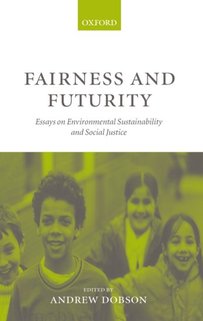
How do environmental sustainability and social justice relate? If future generations are owed justice, what should we bequeath them? Is ‘sustainability’ an appropriate medium for environmentalists to express their demands? Is environmental protection compatible with justice within generations? Is environmental sustainability a luxury when social peace has broken down? The contested nature of sustainable development is considered - is it a useful concept at all any longer? Is it reconcilable with capital accumulation? Liberal -particularly Rawlsian - and socialist notions of justice are tested against the demands of sustainability, and policy instruments for sustainability, such as environmental taxation, are examined for their distributive effects. (Oxford: Oxford University Press, 1999)
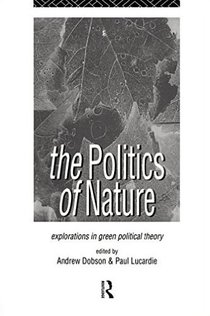
Published in the exciting early days of environmental political theory, this book brought together a group of scholars to discuss green political ideas. It analyses the ability of these ideas to provide plausible answers to fundamental problems in political theory, concerning justice and democracy, individual rights and freedom, human nature and gender. The authors, who come from a range of different disciplines, explore the relationship between green ideas and other traditions including liberalism, anarchism, feminism and Christianity. (London, Routledge, 1993)

Back in the day, ecofeminism, the tragedy of the commons and the steady-state economy were buzz phrases of a blossoming environmental awareness. This book brings together theorists and activists and presents their ideas in their own words, with brief commentaries by me. Looking back, it's striking how relevant all of this still is, especially in the context of an environmentalism that has been taken over by bean counters, as we hurtle towards 4-5 degrees of global warming. (London, André Deutsch, 1991)